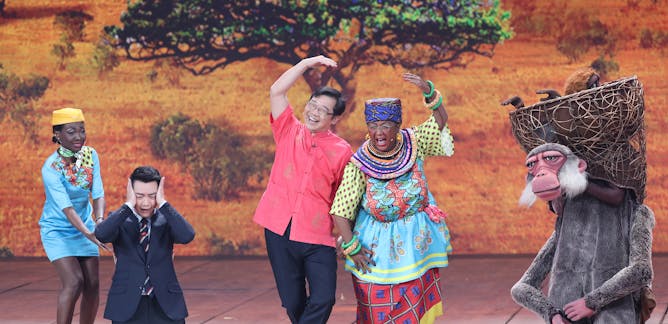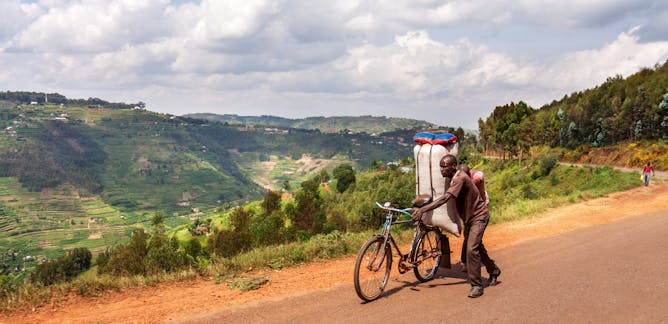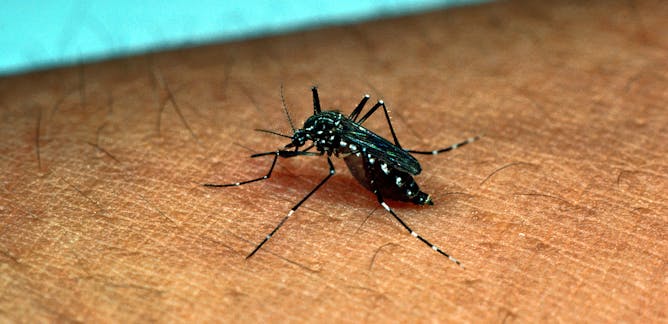| |
|
|
|
|
|
|
| |
|
Editor's note
|
|
South Africa’s Film and Publication Board has banned the award-winning film, Inxeba (The Wound), after being put under pressure by traditionalists and populist politicians. But, as Wamuwi Mbao writes, in a country where violence and abuse towards members of LGBTQI communities is routine, these events shouldn’t come as a surprise.
China's national broadcaster, CCTV, did not think there was anything unusual in flighting a 13-minute skit featuring a Chinese actress in full blackface and a cheerful monkey played by an unidentified African actor during this year’s Annual Spring Festival Gala. Dani Madrid-Morales suggests that the airing of the skit suggests China needs to have a conversation about racial insensitivity.
Rwanda has implemented one of the most comprehensive electrification programmes in the world. Jörg Peters argues that, while the on-grid programme has had positive spinoffs for people living in rural communities, it’s worth considering cheaper ways to extend power to remote areas.
When mosquitoes look for a host to feed on, they are attracted to several different stimuli including light and heat. But what attracts the mosquito that spread the dengue and chikungunya viruses? Eunice Anyango Owino explains how they found out that body odour lures the insects.
|
Charles Leonard
Arts + Culture Editor
|

|
|
Top stories
|

Dani Madrid-Morales, City University of Hong Kong
In China, like in other parts of the world, Africa is routinely treated as a single unit, erasing its linguistic, racial and cultural diversity.
| |

Wamuwi Mbao, Stellenbosch University
The banned film Inxeba certainly deserves more than to languish in the mire of South African scandal.
|

Jörg Peters, University of Passau
A massive rural on-grid electrification programme in Rwanda has delivered considerable benefits. But is it the most sensible way to deliver power to remote areas?
| |

Eunice Anyango Owino, University of Nairobi
In the future, traps for mosquito that spread the dengue and chikungunya virus could be made from the carbon dioxide in human breathe as well as body odour.
|
|
|
Environment + Energy
|
-
Wilhelm de Beer, University of Pretoria
The beetle and the fungus have devastated trees in California in the US as well as in Israel. Now they're in South Africa.
-
Derek E. Lee, Pennsylvania State University
A new study found that community-based wildlife conservation can quickly result in clear ecological success.
-
Josephine Kaviti Musango, Stellenbosch University; Paul K Currie, Stellenbosch University
There are measures in place to manage Day Zero and beyond. Models show that these will not work.
-
Olalekan Adekola, York St John University
Talk of ethnic and religious conflict between Muslim Fulani herders and local Christian farmers misses the full picture – this is about resources.
|
|
Health + Medicine
|
-
Peter Cooper, University of the Witwatersrand
The tale of an unsung South African hero in the field of community health.
|
|
Education
|
-
Sharon Fonn, University of the Witwatersrand
If researchers want to make an impact on public health they can't just have a thorough grounding in their own discipline.
-
Brian Levy, University of Cape Town
Kenyans believe that fixing education is not someone else's task or someone else's failure.
-
John Aitchison, University of KwaZulu-Natal
Every year South Africans spend twice as much on chocolate than they do on books
-
Harry Zandberg Wiggins, University of Pretoria
Through abstraction, the underlying essence of a mathematical concept can be extracted.
-
Sean Archer, University of Cape Town
The ethical and political reasons to avoid free higher education are unambiguous.
|
|
Politics + Society
|
-
Keith Gottschalk, University of the Western Cape
Overall South Africa's new president has a cabinet that forms a team with whom he can work.
-
Mzukisi Qobo, University of Johannesburg
Both the state of the nation address and budget speech didn't leave a sense that there has been much reflection on the depth of the economic malaise gripping South Africa.
-
Carla Lever, University of Cape Town
What makes a successful presidential performance and does South Africa's Cyril Ramaphosa stack up?
-
Mashupye Herbert Maserumule, Tshwane University of Technology
The way South Africa's new president Cyril Ramaphosa has constituted his cabinet reflects the distribution of power within the governing ANC.
-
Christian Bueger, Cardiff University; Timothy Edmunds, University of Bristol
The number of piracy attacks has certainly declined. But the risk of being attacked at sea remains.
|
|
Arts + Culture
|
-
Elmien du Plessis, North-West University
In a society like South Africa's that is increasingly becoming polarised, simplified opinions should be approached with caution.
|
|
Science + Technology
|
-
Asit K. Biswas, National University of Singapore; Cecilia Tortajada, National University of Singapore
There is a rapid shift in production of electric cars all over the world. But how will it benefit ordinary people?
|
|
Business + Economy
|
-
Matthew Kofi Ocran, University of the Western Cape
South Africa's idea of radical economic transformation is missing a critical element.
-
Andrew Hutchison, University of Cape Town; Nkanyiso Sibanda, University of the Western Cape
South African commercial law courses do not address the question of what norms and procedures govern business relations in indigenous African communities.
-
Muneer Hassan, University of Johannesburg
A revenue shortfall of about R50 billion has pushed the South African government to hike Value Added Tax (VAT) among other taxes.
|
|
| |
| |
| |
| |
| |
| |
|
|
|
|
|
|
| |